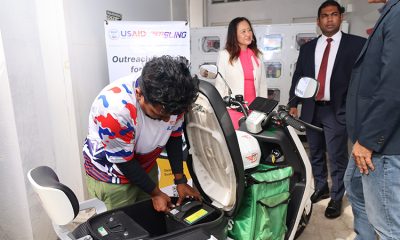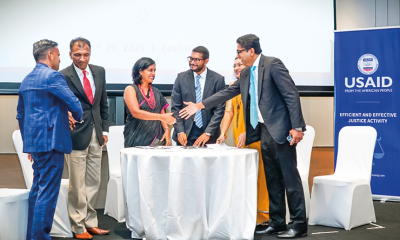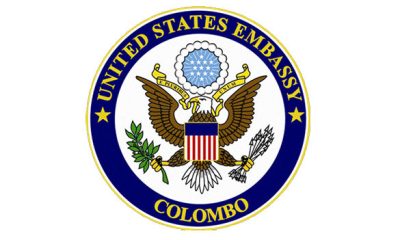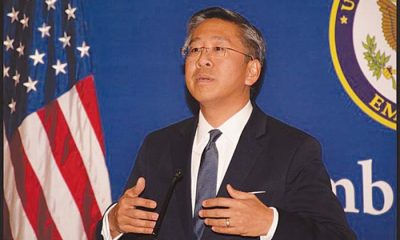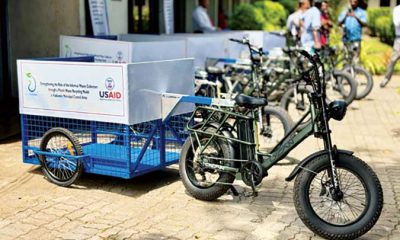Business
USAID and PUCSL partner to enhance transparency with development of Electricity Dispatch Database and Dashboard for Lanka’s power plants

Colombo, December 1, 2023 — The United States Agency for International Development (USAID), in collaboration with the Public Utilities Commission of Sri Lanka (PUCSL), launched the Electricity Dispatch Database and Dashboard, ?an online platform to enhance transparency in the management of Sri Lanka’s power distribution through a visualization platform.
Developed and funded by USAID’s Sri Lanka Energy Program, the Dispatch Data Dashboard is a comprehensive tool that allows stakeholders to access and visualize data relevant to electricity generation, forecasts, costs, reservoir details, and emissions, providing insights into the energy sector’s intricate operational dynamics. The initiative will help foster transparency and accountability within Sri Lanka’s energy.
The Dispatch Data Dashboard features a user-friendly interface, making it accessible to a broad audience. Users will be able to query dispatch data, gaining valuable insights into the dispatch process and the rationale behind cost optimization. This transparency not only promotes accountability but also encourages collaboration among industry players, paving the way for improvements in the dispatch process.
The Dispatch Data Dashboard will be used for a wide array of stakeholders, including sector analysts, researchers, current independent power producers, future renewable energy developers, and environmental organizations. The online dashboard is available at https://gendata.pucsl.gov.lk/home. The USAID Sri Lanka Energy Program is proud to be at the forefront of this initiative, driving positive change for the benefit of all stakeholders.
Members of the public will now have the ability to comprehend the dispatch process, enabling them to raise inquiries and contribute to discussions about the energy sector’s future. This marks a significant step forward in democratizing information and fostering a sense of ownership among the public.
Chris Powers, Director of the Economic Growth Office of USAID stated that, “This Dashboard will help drive financial sustainability of the power sector, while contributing to the viability of the nation by enhancing energy security and ensuring the lowest possible cost of electricity. By fostering transparency and empowering stakeholders, this tool is an instrumental resource in our collective fight against climate change. In understanding and optimizing our energy management processes, we pave the way for a more sustainable future, driving efficiencies that contribute to reducing the cost of power generation while reducing our carbon footprint. In the face of climate challenges, knowledge is power, and the Dashboard empowers us all to make informed decisions that positively impact our environment.”
“The Dispatch Data Dashboard represents a major leap towards a more transparent and accountable energy sector in Sri Lanka,” said Professor Manjula Fernando, Chairman ??? at PUCSL. “By providing a platform for stakeholders to engage with dispatch data, we aim to drive positive change, encourage innovation, and ultimately contribute to a more sustainable and cost-effective energy future for Sri Lanka.”
Business
Will the U.S. 44% Tariff on Sri Lankan Exports Harm Key Industries? Examining the Impact and Sri Lanka’s Path Forward – Ambassador Kananathan

Sri Lanka’s export sector is grappling with a significant challenge following the United States’ decision to impose a 44% reciprocal tariff on Sri Lankan goods. This steep tariff threatens the country’s trade with the U.S., particularly in the apparel industry, which serves as a cornerstone of Sri Lanka’s economy.
Tea and Other Exports Also Under Threat
The repercussions extend beyond apparel, with tea exports at risk due to increased costs that may reduce Sri Lanka’s competitiveness against major producers like India, Kenya, and China. Other key export segments, including spices, seafood, and coconut-based products, are also likely to face price pressures, making it difficult for Sri Lankan exporters to sustain their foothold in the U.S. market.
Given that the United States is a major buyer of Sri Lankan goods, this move raises concerns about trade competitiveness, long-term sustainability, and economic stability. The question now is: how will this tariff impact Sri Lanka’s export-driven industries, particularly apparel, and what strategies can be employed to counteract the effects?
A Major Blow to the Apparel Sector – Sri Lanka’s Leading Foreign Exchange Earner
Ambassador Kana Kananathan, former High Commissioner to Kenya, has warned that this development could severely impact the apparel sector, which accounts for nearly 40% of Sri Lanka’s total exports. With U.S. buyers contributing approximately $3.3 billion annually, the apparel trade constitutes a crucial revenue stream for the nation.
A 44% tariff would substantially raise the cost of Sri Lankan apparel, making it less competitive compared to manufacturers in Bangladesh, Vietnam, Cambodia, and India. This could lead to a significant drop in orders from American buyers, posing a serious threat to the industry’s growth and employment rates.
Navigating the Challenge: Government and Industry Response
While immediate government intervention is necessary to mitigate these effects, businesses must also take proactive measures. Innovation, market diversification, and strengthening supply chain resilience will be essential strategies for overcoming these trade barriers. With the right approach, Sri Lanka can navigate this challenge and position itself more robustly in the global marketplace.
Ambassador Kananathan also suggested that exporters explore the ‘1/3 Cost-Sharing Model’ as a potential solution. Under this approach:
=Sri Lankan Manufacturers accept a partial reduction in profit margins, ensuring their products remain competitively priced.
=U.S. Retailers and Brands agree to absorb a portion of the tariff, recognizing the value of maintaining a reliable Sri Lankan supply chain.
=Raw Material Suppliers provide pricing flexibility, such as offering discounts or extending credit terms, to help offset cost increases.
By adopting these strategic adjustments, Sri Lanka’s export industry can mitigate the immediate impact of the tariff while laying the foundation for long-term trade resilience.
( Ambassador Kananathan was Sri Lanka”s former High Commissioner to Kenya and with concurrent accreditation to 23 African countries as well as Sri Lanka’s Permanent representative to UNEP and UN Habitat)
Business
Three Sinha Industries wins award for excellence at SLIA

Three Sinha Industries Pvt. Ltd. has been recognised with the Award of Excellence at the Sri Lanka Institute of Architects (SLIA) Annual Product Awards, held recently in Colombo. The award was presented for the company’s high-quality, fire-resistant doors, which are made using locally sourced materials and designed to meet the highest safety standards. The award ceremony was held recently in Colombo, and Managing Director Manjula Ariyakumara accepted the award on behalf of the company, marking yet another milestone in Three Sinha’s journey of excellence.
From its establishment as a small-scale business, Three Sinha has grown into a trusted name in Sri Lanka’s construction industry. The company has built a strong reputation for its commitment to quality, innovation, and reliability, earning both local and international recognition. Over the years, it has received several certifications for maintaining top-tier quality standards. Three Sinha has also received many other local and international awards.
Three Sinha Industries offers a diverse range of products and services, including roller doors, shutters, and fire-resistant doors that provide enhanced safety and durability. The company also specialises in aluminum fabrications, sensor doors, and automatic barriers, ensuring a comprehensive suite of solutions for the construction sector. Embracing sustainability, Three Sinha has expanded into green energy solutions, offering three types of solar PV electricity systems: on-grid, off-grid, and hybrid. Additionally, its subsidiary, IKLO Industries, focuses on pre-fabricated and pre-engineered steel buildings, incorporating advanced technology to meet modern construction demands. IKLO has also ventured into the agricultural sector by introducing tractor trailers tailored for farming needs. Moreover, the company manufactures high-quality diesel tanks that meet the standards of both the Ceylon Petroleum Corporation and the Indian Oil Corporation.
Business
Amana Life Insurance Delivers Exceptional Returns to Policyholders in 2024

Amana Takaful Life Insurance PLC has once again demonstrated its commitment to delivering unparalleled financial security and growth, delivering attractive returns for long-term policyholders for 2024. As a trusted long-term insurer, Amana Life provides policyholders with the best investment choices, ensuring they can build and secure their financial future with confidence.
This achievement is driven by the company’s diverse, risk-rated investment options, strategically allocated across fixed deposits, bank investments, equity markets, and gold funds. This structure allows policyholders to balance security and growth, selecting funds that align with their financial goals while adapting to market conditions. As the only life insurer in Sri Lanka offering such flexibility, Amana Life empowers customers to optimize their investments while maintaining long-term financial stability.
The review of Funds as of December 31, 2024, demonstrates exceptional returns across all investment avenues, reaffirming Amana Life’s position as the insurer of choice for those seeking the best investment opportunities. The Protected Multiple Fund (PMF), with a Fixed Deposit base of 90% of its fund value, demonstrated steady returns, despite Sri Lanka experiencing interest rate cuts regularly over the past 24 months. PMF produced returns of 18.1% for the said period on an annualized basis while the market rates for Fixed Deposits reached single digits towards the latter part of 2024.
“At Amana Life, we are committed to providing our long-term policyholders with both protection and rewarding investment opportunities,” said Gehan Rajapakse, CEO of Amana Takaful Life PLC. “These results prove that we are not just offering life insurance, but also a well-structured pathway for long-term financial security and growth. However, it is important to note that past returns are not a guarantee of future performance, as market conditions can influence future results.”
-

 Business2 days ago
Business2 days agoStrengthening SDG integration into provincial planning and development process
-

 News6 days ago
News6 days agoBid to include genocide allegation against Sri Lanka in Canada’s school curriculum thwarted
-

 Business1 day ago
Business1 day agoNew SL Sovereign Bonds win foreign investor confidence
-

 Sports3 days ago
Sports3 days agoTo play or not to play is Richmond’s decision
-

 Business1 day ago
Business1 day agoDaraz Sri Lanka ushers in the New Year with 4.4 Avurudu Wasi Pro Max – Sri Lanka’s biggest online Avurudu sale
-

 Latest News5 days ago
Latest News5 days agoIPL 2025: Rookies Ashwani and Rickelton lead Mumbai Indians to first win
-
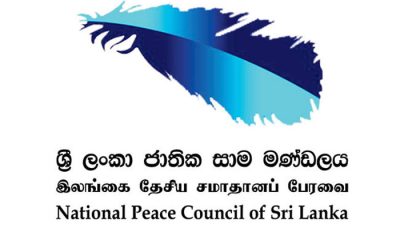
 News6 days ago
News6 days agoSL needs a comprehensive solution, not selective justice: NPC
-
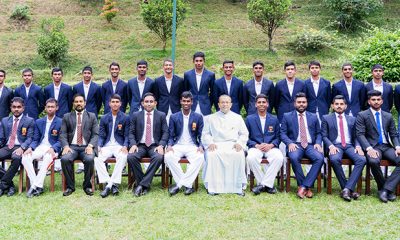
 Sports4 days ago
Sports4 days agoTrinity, St. Anthony’s out to end decade long victory drought


